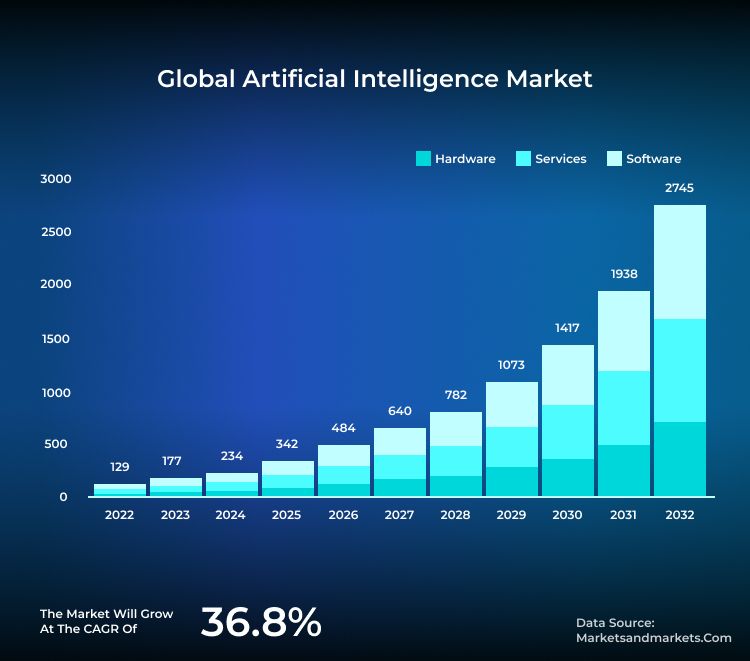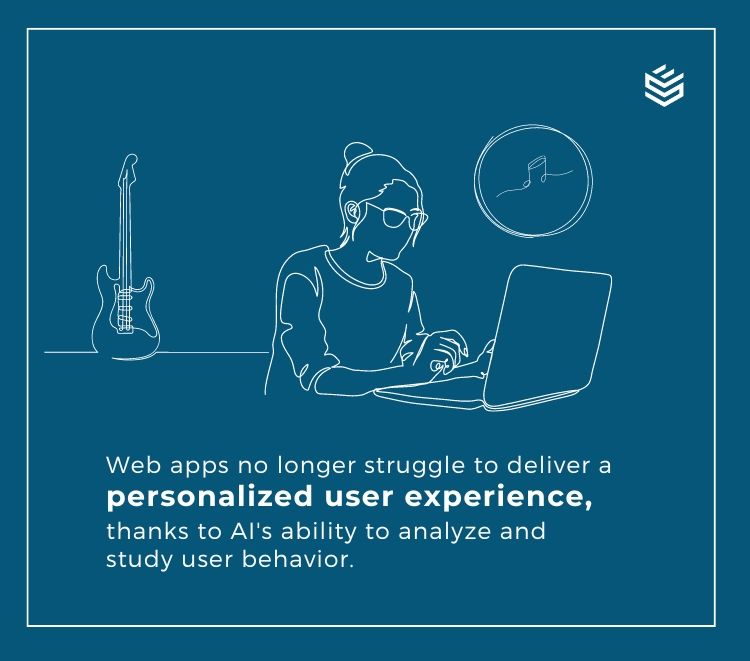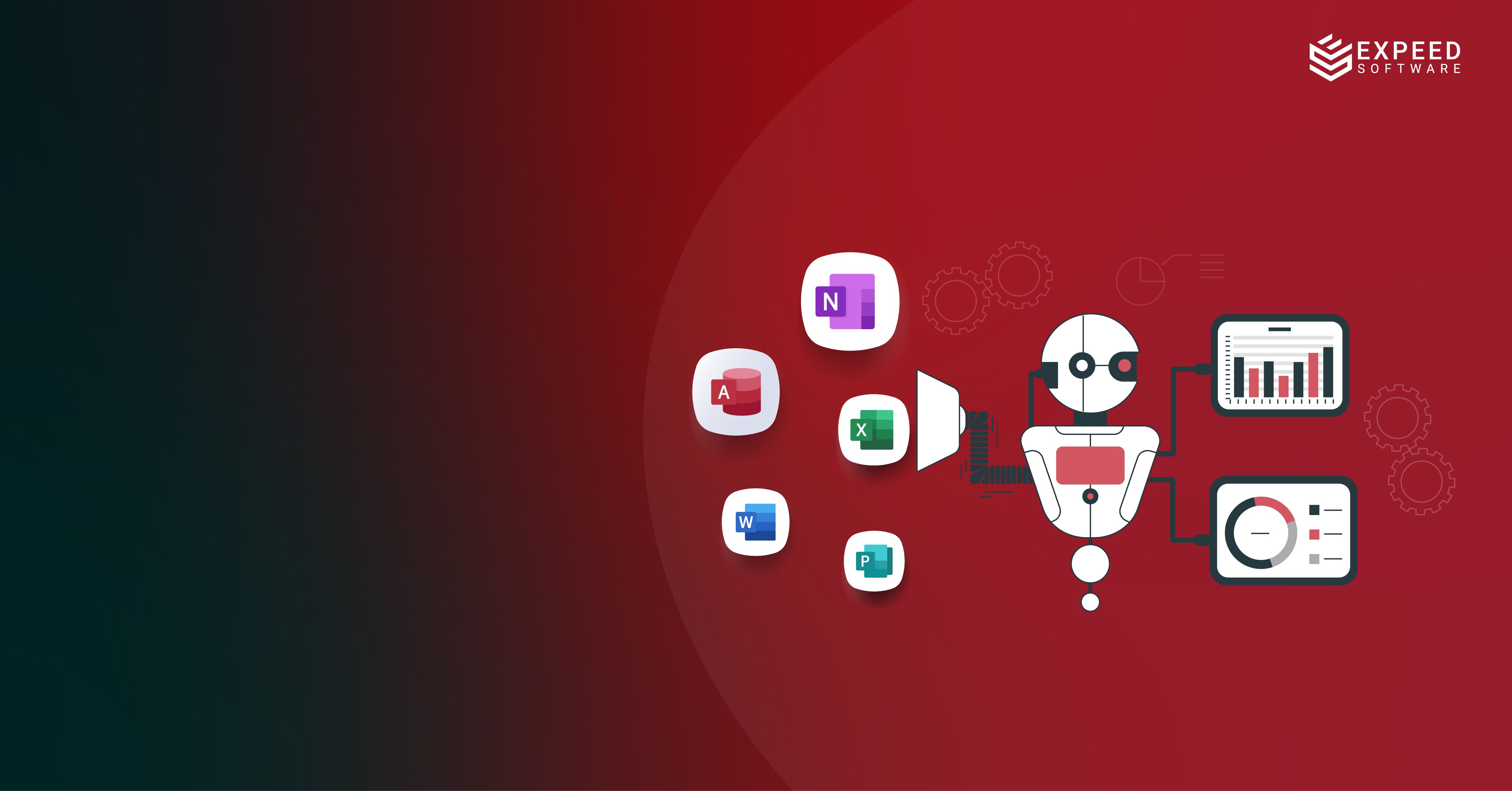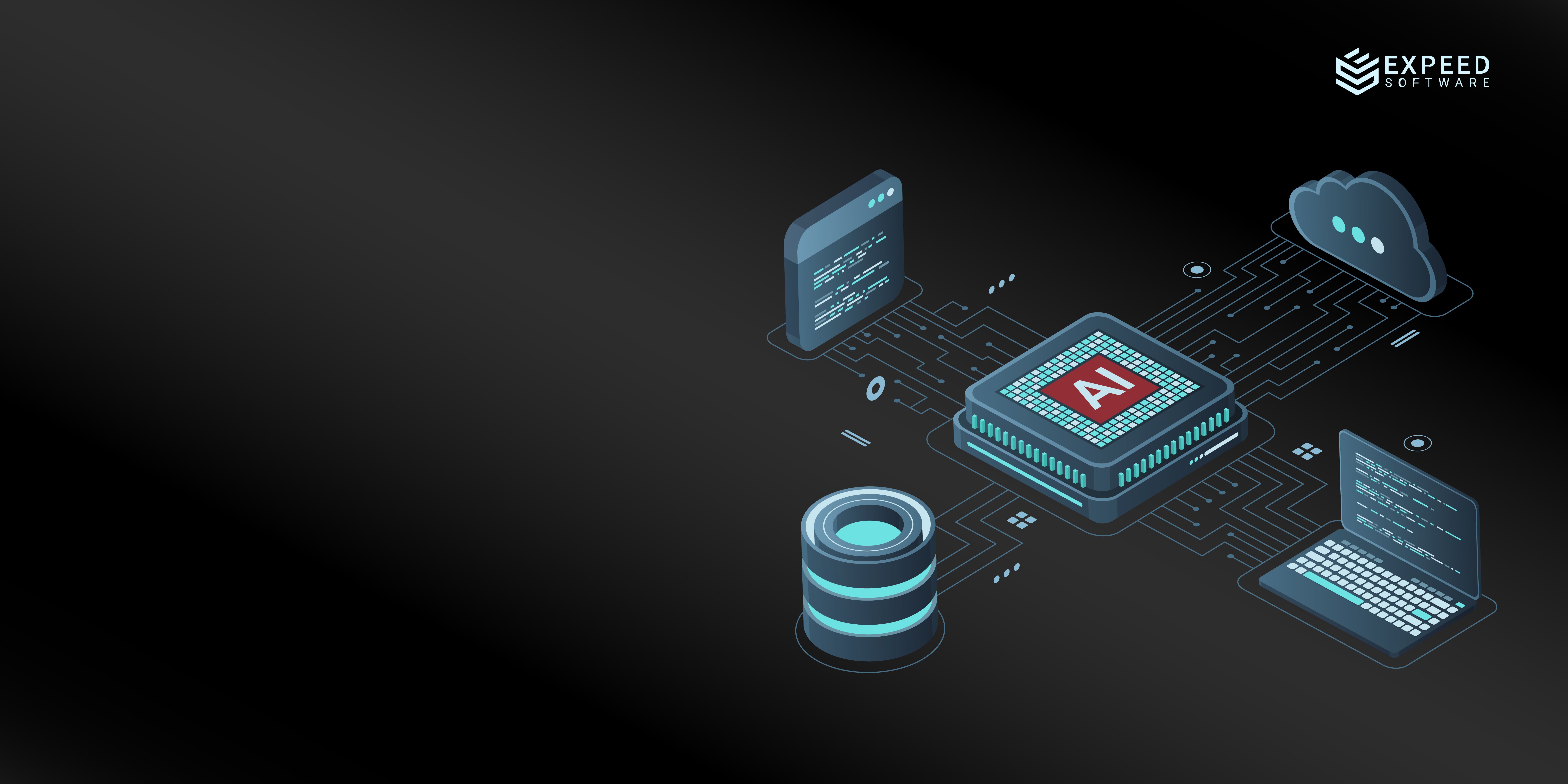Future of AI in Web App Development
Take a look at the last couple of years and this is what you will see in the technology landscape. No technology has managed to stay in the news due to its continuous advancements in various sectors, like AI. Today, the field of web development is witnessing the deep impact of AI. The kind of automation and precision AI tools brought along have resulted in a technical revolution in web app development.
Traditional web app development involves hours of complex coding to meet a client’s tailored needs. AI significantly reduces this workload and streamlines the development process effectively. AI’s ability to adapt to complex algorithms, codes, and logic made the web industry flourish massively in a short timeframe.
This year, we expect the global AI market to rise further, currently valued at $150.2 billion. Additionally, studies point out that the AI market will grow at a CAGR of 36.8% from 2023 to 2030.

By leveraging the power of data analytics, predictive analysis, machine learning, etc., artificial intelligence is slowly becoming the perfect support to web development. However, AI can never deliver a perfect product in isolation. The key lies in steering the technical prowess of AI toward specific directions to yield results for developing tailored web app solutions.
This blog explores the opportunities AI presents for web app development companies and how it is a game-changer technology in elevating web applications to new heights.
Impact of AI in Web App Development
AI is more of a necessity than a mere trend. It is becoming the driving force behind the rapid evolution of technology in the web world. Though the web is not new to new technologies, the dominance of AI has brought a significant shift in this landscape. The integration of AI tools into web applications as well as its use in web development have helped both the developers and the customers.
Take a look at what Elon Musk, the billionaire Tesla CEO, has to say about the advancement of artificial intelligence:
“It’s hard to say exactly what that moment is, but there will come a point where no job is needed. You can have a job if you want to have a job — sort of personal satisfaction — but the AI will be able to do everything.”
– Elon Musk (CEO, Tesla)
From offering performance enhancement measures to the best SEO strategies, AI is like a Pandora’s box that offers numerous tools. These can be used to explore the maximum efficiency of web apps. Thanks to AIs ability to analyze and study user behavior, web apps no longer struggle to deliver a personalized user experience.

Let us see how AI, being a transformative force, is reshaping the world of web app development.
Generative Artificial Intelligence and Low-Code Platforms
Out of all the evolutionary innovations that AI has brought into the digital world, Gen AI will probably be on the forefront. Developers and most business sectors are embracing Gen AI tools, the latest trend in artificial intelligence technology. Rather than depending on a web development company for building a web app, Gen AI tools come in handy for creating code snippets, logic, and modules if provided with the right textual prompts.
However, low-code platforms are providing the same functionality for quite sometime such that Gen AI tool functionality is not new. It is natural to suspect whether Gen AI tools will replace the low-code platforms, considering their dominance in every sector. Instead, the co-existence of these two technologies creates a plethora of possibilities.
To understand how AI can make web app development a cakewalk with low-code platforms, let us consider a practical example by going through the steps a user might go through while developing an application:
Scenario: Mary is going to build a web application using a low-code platform with AI integration.
Step 1: Mary logs into the low-code platform and starts a new project. The AI-integrated platform will prompt Mary to enter basic details regarding the project, such as its purpose, target audience, and desired output.
Step 2: Sara, who is not an expert with codes, enters textual prompts into the platform by specifying details of the project. Using natural language, she enters details regarding customer segmentation, the project algorithm, logic, and workflow.
Step 3: The AI engine fused into the low-code platform will generate a preliminary design of a web application. They do this by analyzing the data entered by Mary and studying the design requirements. This preliminary design has workflow logic, user interface elements, and data models.
Step 4: Mary can now analyze the design returned by the application. With the help of a drag-and-drop interface, she can move, modify the UI, and correct the workflow, if any.
Step 5: Once the corrections are done, Mary can utilize the AI-powered features to bring in the certain functionalities. Mary can feed the platform with her organization’s customer data to train the model. The platform can train AI models using this data, fine-tuning the algorithms.
Step 6: Once the application returns results, Mary can test it. It can be done by simulating different user scenarios and making refinements based on the results.
Step 7: After completing all the testing, Mary can deploy the web app. Even then, Mary will be able to iterate the application for further testing over time. This is done by utilizing the low-code platform’s built-in analytics and monitoring tools.
By leveraging the power of AI integrated with the low-code platform, Mary was able to build a web application from scratch. She achieved this by letting the system know her requirements in detail, including the logic and workflow strategy to produce tailored results.
Web App Development in the AI Era
Considering the rate at which AI technologies are expanding and flourishing, opening new possibilities in the tech world, their impact on web app development will be revolutionary in the future. From automating redundant tasks to helping out stakeholders with varying requirements in a system, AI is bringing new possibilities every now and then. This will affect the future of web development in a big way. Below are the ways AI will revolutionize the web development industry in the future:
1.Personalization-Boost by AI
A personalized experience is always a success formula when it comes to web apps. An application that can deliver tailored experiences to each user will naturally invite positive feedback from customers. Efficiency and personalization combine to ensure a high success rate.
Web applications will be able to analyze a vast amount of user data to identify behavior patterns, tailored preferences, and needs. They can do so by leveraging the power of machine learning algorithms. This helps web app development companies develop applications that deliver highly personalized content. This comes with an interactive and engaging interface that delivers the best results for individual users.
A good example of this is the functioning of e-commerce applications. They return potential recommendations after analyzing your search history to learn your behavior and needs. They then deliver tailored recommendations on e-learning platforms after analyzing your scores and interests.
2.Intelligent Automation
By utilizing natural language processing (NLP) and computer vision, AI can simplify intelligent automation in web applications. Computer vision relies on deep learning models, neural networks, and machine learning algorithms to interpret visual data to extract meaningful insights. On the other hand, NLP helps systems understand, interpret, and generate prompts based on human languages.
Many sectors, such as speech analysis, machine translation, visual assistance, image acquisition, text analytics, etc., will undergo notable transformations in the future. This makes data processing a much easier task.
3.Predictive analysis and decision-making
Web app development companies are getting enough juice to build optimized web applications with the help of predictive analysis. By studying historical data, user behaviors, and market trends, predictive analysis can forecast future outcomes. Based on these results, developers can tweak web applications in real-time scenarios to meet user needs and expectations. This will deliver a personalized and optimized experience.
4.Intelligent Chatbots
It is the era of chatbots. AI-generated bots, developed to meet specific requirements, are ruling the tech world. Chatbots are making the best use of the advancements happening in the natural language processing sector. Offering real-time, humanified interactions, chatbots are escalating the interaction game in the web app interface. Developing chatbots that can deliver personalized customer support, handle orders, etc. will automatically enhance the customer experience to a notable level.
A study predicts that the chatbot market size will reach USD 20.81 billion. The technology’s advancements directly contribute to this boom in chatbot popularity.
5.AI-powered voice interfaces
Again, thanks to natural language processing technologies, AI-powered voice interfaces can become the next big thing in web applications. In the future, web apps with voice interfaces integrated into them can let users communicate with the application using voice commands. Such an interface will be a huge perk when it comes to empowering user interaction, thereby ensuring a good user experience. People can use web apps in a hands-free interaction mode, enabling users with disabilities to make use of the features offered.
6.Enhanced Web Security with AI
There is no room for compromise in the field of web security. With evolving technologies, cyber-attacks are also escalating, making systems vulnerable over time. This makes the demand for tight security a necessity for web apps.
AI algorithms can be used to observe a vast number of anomalies, identify potential breaches, and respond accordingly. Hence, we can for sure expect AI-driven web security measures to become a compulsory addition to web applications. This will fortify client data and secure the system from attacks. As the nature of threats in the cyber world is escalating day by day, the utilization of such advanced technologies is mandatory to protect user privacy.
Emerging Trends in AI-Integrated Web App Development
Web app development companies are making use of plenty of advanced, in-the-rise technologies. They do this to make web applications feature-rich based on client requirements. Following are a few technologies that are on the rise and can make a huge impact in the future:
1.Edge AI for Web Applications
The web app development sector heavily utilizes edge computing technology. The introduction of edge AI will enable edge devices to leverage AI capabilities to enhance performance, reduce latency and deliver an enhanced user experience.
2.AI-Driven DevOps
The power of AI can not only enrich the user experience of a web application. It can also help developers create game-changing web applications by utilizing AI-driven web app tools. This can help streamline the delivery process of web applications by boosting various web development sectors. The sectors include design, development and deployment, ensuring fast delivery of projects.
3.AI-Powered UI/UX Design Tools
It is the UI/UX team that is responsible for creating user-friendly, intuitive interfaces for web apps. The emergence of AI allows us to safely submit the UI/UX design phase to AI design tools, which generate creative, user-focused designs, thereby reducing the design phase’s time consumption.
4.Automated development tools
The overall web application development process can benefit from the luxury of automation that AI has brought about. During the coding phase of developing a web app, developers can use AI algorithms to analyze and optimize their codes. AI tools can also be used during the testing and quality assurance phases, generating use cases, identifying potential bugs and clearing them off right away. This boosts the overall quality of the application right before deploying it.
Challenges and Considerations
It is important to address several challenges lying ahead of us while discussing the future of AI in web app development. Below are certain things to be cautious about as AI continues to dominate the web world. It does so with its rich feature set and abundant options to automate tasks.
Privacy Concerns: As AI-driven tolls naturally depend on a large set of user data, the concern over privacy will grow. Hence, it is important to make sure that these applications adhere to data protection regulations. It should also ensure robust security measures to safeguard user privacy.
Biased Algorithms: As people start to depend on AI more than any other source to access information, the algorithms are more likely to deliver discriminatory information based on the way they are trained. During the design and development of AI algorithms, developers must take measures to promptly handle such issues and incorporate fairness considerations by doing general audits.
Technical Complexity: Web app developers must continuously learn and adapt to the ever-evolving field of AI. Integration and implementation of web app technologies in web apps require handling complex codes, infrastructure, and logic. Only through continuous training and inter-team collaboration can we develop an effective AI-integrated web app.
As time goes by, AI is only going to get stronger. With its advancement in the tech world, automation, and information generation too will engulf web apps, making them highly efficient and reliable. Apart from the above-discussed points, AI will continue to dominate various sectors of web development by yielding results regarding hyper-personalization, augmented content creation, and more.
At Expeed Software, we are at the forefront of harnessing this technology as a web app development company. We are actively integrating AI into our web applications to achieve optimal results and customer satisfaction. Consult Expeed Software to embark on a new journey with AI-powered web applications!

Expeed Software is a global software company specializing in application development, data analytics, digital transformation services, and user experience solutions. As an organization, we have worked with some of the largest companies in the world, helping them build custom software products, automate processes, drive digital transformation, and become more data-driven enterprises. Our focus is on delivering products and solutions that enhance efficiency, reduce costs, and offer scalability.


